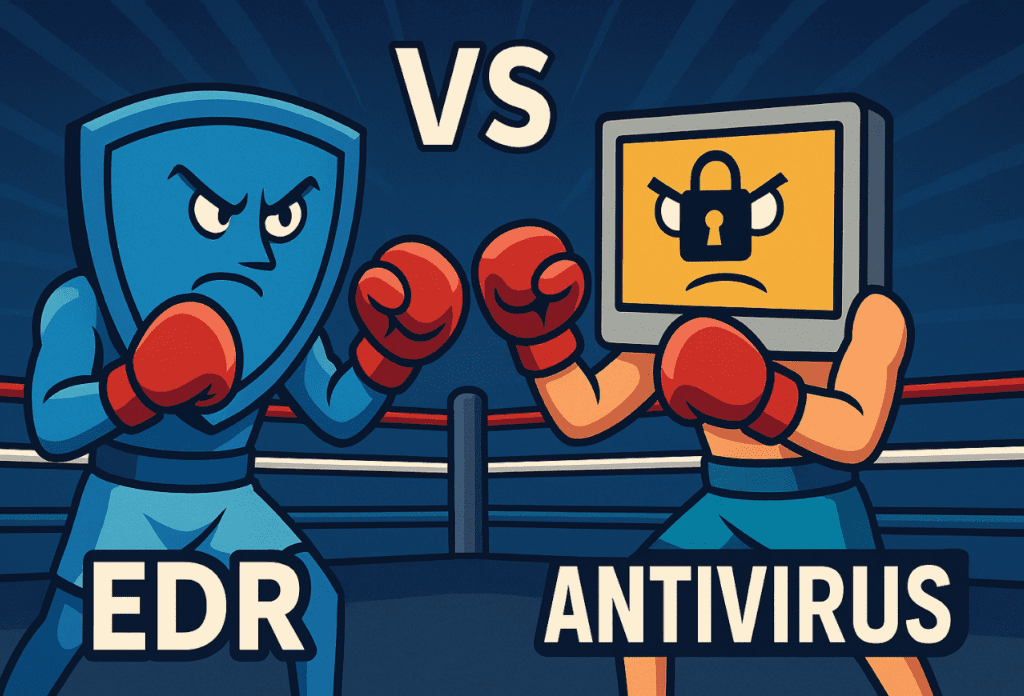With cybercrime costing the world $9.5 trillion USD in 2024, companies are becoming more aware of the need for cybersecurity & IT. With costs of attacks increasing each year and the threat of a breach being devastating, many businesses are left wondering: What is the difference between EDR and Antivirus?
Let’s break down the core differences between these two cybersecurity solutions to help you decide which one is the right fit for your organization.

How Traditional Antivirus Works
Antivirus software has been a cybersecurity staple for decades, primarily known for using threat signatures to detect and block malware. It is simple and ideal for the average user on a device. Here’s how antivirus protects your system:
- Looks for Known Viruses: It scans files and matches them against a list of known threats.
- Effective for Known Threats: It works well for known and documented malware but struggles with new, unknown threats, such as (zero-day) exploits.
- Easy on Your System: It doesn’t use a lot of computer power, mainly running quietly in the background.
Antivirus may be a good first line of defense, but as cyberattacks continue to grow increasingly smarter and sophisticated each day. That’s where we see EDR come into play.
What is Endpoint Detection and Response (EDR)?
Endpoint Detection and Response (EDR) is a newer, more advanced tool that goes beyond what antivirus can do. It watches how your devices behave and spots unusual activity that could be a threat. Here’s what it does:
- Can Detect More Advanced Attacks: Because EDR monitors behavior and processes, it’s capable of identifying threats that don’t rely on traditional malware files.
- Automated or Manual Responses: EDR can isolate endpoints, quarantine threats, reverse unauthorized changes, and kill malicious processes. It also allows an IT team to remotely access endpoints (devices connected to a network), conduct investigations, and manually fix issues.
- Threat Intelligence: EDR tools are able to pull in global threat data to identify emerging attacks faster. It may identify known malicious IP addresses or domains and correlate observed behaviors with known threat patterns.
Now that you know what both tools do, let’s look at how they compare to each other.

Photo by PurpleSec
Key Differences Between EDR and Antivirus
While both tools are designed to protect your device and data, they do it in very different ways. Here’s a side-by-side look at how they compare to each other:
- Individual vs Business Needs: Antivirus may be enough for individuals, but for businesses with more than a few people, it doesn’t defend well against more advanced security threats.
- Sensitive Industries: If you are in an industry that handles very sensitive client data, such as finance, healthcare, or law, then EDR is a crucial component for security.
- Cost: Antivirus is usually on the cheaper side. While EDR does cost more, it has the benefit of significantly stronger protection.
- Tech Resources: Antivirus is easier to manage, while EDR may need IT support or a security partner to maximize its full capabilities.
No matter which you choose, the goal is the same. To keep your sensitive client data safe from cyber threats. But between the two options, we have a clear favorite.

Photo by Medium
Why EDR Is the Smarter, Stronger Choice
While antivirus software has its role in basic protection, it’s no match for the more advanced threats that are emerging daily. EDR offers real-time visibility, faster responses, and deep threat intelligence, making it a clear choice for businesses that take data protection seriously. But as we covered, EDR tools can be expensive and resource heavy, so that’s where a Managed Security Service Provider (MSSP) like us comes in.
We’re able to provide businesses with enterprise-grade protection without the added costs that come with an in-house IT team. By partnering with us, your business gets proactive cybersecurity & IT protection that’s more powerful and more affordable than using an in-house team. Our goal is to give our clients the best ROI possible while maximizing data security.
Consider scheduling a free cybersecurity and IT infrastructure assessment with us. We’ll help analyze gaps in your security and show how we can strengthen it together.
Contact us today to strengthen your data security!
Call Us: (479) 434-1400 – Speak directly with our team.
Visit Our Website: www.kirkhamirontech.com – Learn how we can strengthen your data.
Email Us: info@kirkhamirontech.com – Let us know your cybersecurity questions.

 Tom Kirkham brings more than three decades of software design, network administration, and cybersecurity knowledge to organizations around the country. During his career, Tom has received multiple software design awards and founded other acclaimed technology businesses.
Tom Kirkham brings more than three decades of software design, network administration, and cybersecurity knowledge to organizations around the country. During his career, Tom has received multiple software design awards and founded other acclaimed technology businesses.

